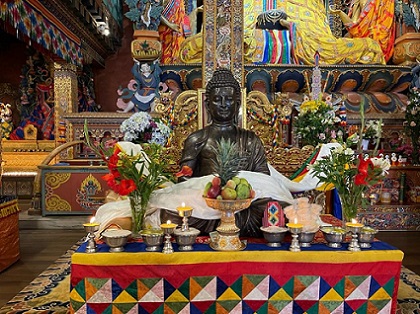After having been involved in renovation of several heritage sites in Bhutan over the past many years, India today announced funding of six more key cultural projects in the country, committing an amount of Nu./Rs. 1691 million as part of the development assistance assured by the India to Bhutan under the 12th Five Year Plan.
With Buddhism – the shared spiritual heritage of India and Bhutan- in many ways the unchanging constant in the age-old bilateral relationship, the development cooperation in the field of cultural heritage between the two neighbours has seen renovation of sacred sites such as the Semtokha Dzong, Paro Dzong, Lhuentse Dzong, Trashigang Dzong, and the Phajoding Lakhang. India has also constructed the Dagana Dzong and been part of conservation efforts at Gasa Dzong.
The Bhutanese constitution declares that Buddhism is the spiritual heritage of Bhutan and that it is the responsibility of the state to preserve, protect and promote the cultural heritage, including monuments, Dzongs (fort-monastery), Lhakhangs (temple), and other places and objects of artistic and historical interest. Preservation of culture is also one of the four pillars of Gross National Happiness, a development paradigm espoused by the 4th Druk Gyalpo.
According to the Indian embassy in Thimphu, India is financially supporting the reconstruction of Wangduephodrang Dzong which was damaged in a tragic fire incident in 2012. The objective of the project is to rebuild the Dzong to its former glory, keeping the traditional architecture intact while making the structure disaster resilient. The restoration works of the Dzong will be completed in July 2022.
Through its Project Tied Assistance to Bhutan, India is also helping restore the Rigsum Goempa Lhakhang, a prominent religious site in Bhutan located in Trashiyangtse Dzongkhag. The project will help restore the main Lhakhang, constructa Drasha (monk hostel) and develop the site in its entirety.

India collaborated with Bhutan in the restoration and consolidation of the Trashigang Dzong after it was damaged due to an earthquake in September 2009 (Image courtesy: Indian Embassy in Bhutan)
India is also providing financial assistance for the restoration of Lingzhi Dzong which was constructed in 1667 as the last frontier Dzong bordering Tibet. Situated at a height of 4150 meters in the remote region of Lingzhi in Northern Bhutan, the dzong had suffered major damages during the earthquake of September 2011.
The site of Sangchen Choekar Monastery in Paro, which was also damaged during the 2011 earthquare, is being restored through funding by the Indian government.
Besides restoration and conservation works, India is undertaking construction and expansion works at Pemagatshel Dzong and Sarpang Dzong as part of the Project Tied Assistance under the 12th Five Year Plan.
In addition to the financial assistance for the restoration and conservation of iconic cultural sites in Bhutan, India also offers scholarships, cultural exchange programmes and courses in Sanskrit studies and Buddhist philosophy which are regularly availed by many deserving students and practitioners from Bhutan.
In 2003, #India was proud to partner with #Bhutan on the renovation of the #SemtokhaDzong – a project to preserve Bhutan's cultural and spiritual heritage. Do take a look at the breathtaking beauty of Bhutan's oldest Dzong! #MagicalBhutan #DevelopmentPartners pic.twitter.com/6yVcJPGFY3
— Utkarsh Duggal (@UtkarshDuggal) June 4, 2021
New Delhi recently granted two acres of land in Varanasi for the construction of a Buddhist temple and guest house for monks of the Central Monastic Body, who are expected to visit Varanasi in large numbers, given that Deer Park, the site where Lord Buddha gave his first sermon on the 4 Noble Truths, is only 10 kms away.
In 2016, India had loaned a precious six-feet tall statue of Zhabdrung Rincpoche, Bhutan’s founder and unifier, to the Royal Government of Bhutan; the statue was subsequently placed at Bhutan’s spiritual landmark and the oldest Dzong – the Semtokha Dzong.
To commemorate the birth anniversary of Guru Rinpoche in June 2021, India gifted a statue of Lord Buddha to Bhutan which was consecrated at the Kuenray or the sanctum sanctorum of the majestic Tashichhoe Dzong- the seat of Bhutan’s government.
The precious thread of Buddhism, which ties India and Bhutan, continues to be an important pillar of the bilateral relationship.
From the plains of Magadha in India, the teachings of Lord Buddha traveled to the Land of Thunder Dragon over centuries courtesy monks and scholars. The legendary Indian mystic Guru Padmasambhava is credited with introducing Vajrayana Buddhism to Bhutan in the 8th century A.D. Today, Buddhism is embedded into the very landscape of the Bhutanese kingdom.
The Indian government says that it is committed to furthering these engagements with the people and the government of Bhutan in order to preserve and celebrate the rich intangible cultural heritage of the region.
Also Read:




















